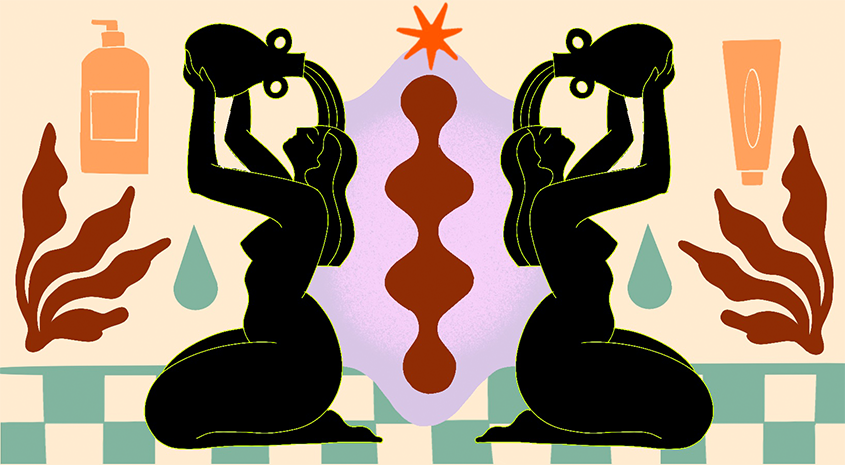What are the toxic ingredients in feminine washes?
Rythm screens all products featured on The Drop and our platform. If a product contains one of the following ingredients, it will not be considered ‘Rythm-approved’:
-
- Benzethonium Chloride
-
- Benzocaine
-
- Butylparaben
-
- Cyclic silicones
-
- Diazolidinyl Urea
-
- Dioxin & Furans
-
- DMDM Hydantoin
-
- Ethylparaben
-
- Ethoxylated ingredients
-
- Formaldehyde-releasing chemicals: (Quaternium 15)
-
- Glycerin
-
- Methylchloroisothiazolinone / Methylisothiazolinone
-
- Methylparaben
-
- Mineral Oil, Paraffin, Petrolatum, and Petroleum
-
- Octoxynol 9
-
- Phthalates
-
- Polyethylene Glycol (PEG)
-
- Polyoxymethylene Urea
-
- Propylparaben
-
- Propylene glycol
-
- Quaternary Ammonium Compounds/ Quaternium
-
- Synthetic Dyes
-
- Synthetic Fragrance
-
- Synthetic Flavors
-
- Triclosan
-
- 2-Bromo-2-Nitropropane-1, 3-Diol
-
- Talcum powder
Vulva v. Vagina
To make sure we are all on the same page, I want to establish the difference between the vulva and the vagina.
Regarding female anatomy, the vulva is what can be seen externally between the legs of a person who is assigned female at birth – the mons pubis (mound with pubic hair), the labia majora and minora (aka ‘lips’), and the head of the clitoris.
The vagina, in contrast to the vulva, is internal. You can only see the vaginal opening when looking at the vulva. In this image, the vagina is labeled as the ‘vaginal canal’ and is highlighted in teal.
For this article, I will be discussing washes that are designed to be used externally on the vulva. We (along with doctors and healthcare providers) advise against washing your vagina. Products discussed below should not be inserted into the vaginal canal internally – many products say on the package ‘for external use only.’
What are the different types of ‘feminine washes’ that are safe to use for your vulva?
Water
Though it may feel counterintuitive to us, many healthcare professionals recommend washing your vulva with clean warm water to remove any sweat/dirt/etc. from your vulva. The vagina itself is self-cleaning when its microbiome is balanced, and using improper or toxic products that contain irritants or certain chemicals can mess with this balance (causing further issues like vaginitis).
Cleveland Clinic offers the following advice:
-
- “Use warm water to wash the vulva. Dry thoroughly with a clean towel. (If the vulva is very irritated, you can try drying it with a blow dryer set on cool.)”
-
- “The vagina cleanses itself naturally in the form of normal, vaginal discharge. Avoid using douches unless prescribed by your physician. These products can upset the natural balance of organisms.”
Water and Mild Cleanser
According to Medical News Today, “A 2017 review of specialist literature suggested that a person should regularly clean the skin of the vulva with mild, unscented, soap-free washes to prevent the buildup of sweat, menstrual blood, dead cells, and other biological material that could accumulate harmful bacteria.”
When we say a ‘mild cleanser’ we are referring to a cleanser that doesn’t contain toxic chemicals (listed later in this article), fragrances, or dyes.
Cleansers Designed for Vulvar Use
This advice is based on various official guidelines suggesting the use of “gentle hypoallergenic liquid washes” to clean the vulva. One such set of guidelines is from the Royal College of Obstetricians and Gynecologists issued in 2013, which says:
-
- “Too much washing can make the symptoms worse so you should clean the vulval area only once a day. If possible, have a shower rather than a bath”
-
- “Don’t use antiseptics. Avoid using sponges or flannels to wash the vulva as these can irritate the skin.”
Emollients
Emollients are a bit less well-known (if we’re being honest, I had never heard this word in my life before now). Per the NHS, “Emollients are moisturizing treatments applied directly to the skin to soothe and hydrate it. They cover the skin with a protective film to trap in moisture. Emollients are often used to help manage dry, itchy or scaly skin conditions such as eczema, psoriasis and ichthyosis.” They can come in the form of lotions, sprays, creams, and ointments, and can serve as soap substitutes. In certain cases, using emollients in lieu of soap can protect the skin.

Does ‘feminine wash’ help pH balance?
When you hear discussions about pH balances and washes, first, keep in mind that in cases of vaginitis or STIs, washes will not ‘help’ or cure anything – you should see a healthcare provider for treatment.
When buying or using any sort of wash designed for the vulva, you’ll want the product to be “pH balanced.” Kushae explains it perfectly: “Be sure the feminine wash is pH balanced. Regular soap is highly alkaline, while the vulva skin (and vagina) prefer to be acidic. A feminine wash that is pH balanced has a more acidic formula and would be more gentle to your vulva.”
Do ‘feminine washes’ help yeast infection?
According to an article on Medical News Today, “Washing the vagina will also not remove vaginal infections. In some cases, it may even make them worse. Using harsh soaps may dry out the delicate vaginal tissue, causing tiny tears that make it easier for dangerous bacteria to infect the vagina.”
Vaginitis (like yeast infections and bacterial vaginosis) is more likely to occur in damp or moist conditions – this is why Planned Parenthood recommends that you “keep your genital area as dry as possible,” and that you “Don’t sit around in a wet bathing suit or damp clothes.” Also, change your underwear when damp and daily.
Safe & Rythm-Approved Cleansers
-
- Dove Original Beauty Bar (about $2 per bar)
-
- Osea V Cleanse ($38)
Do you have a favorite wash that wasn’t listed here? Email us to get yours product added.
Written by:
Gillian ‘Gigi’ Singer, MPH
American Board Certified Sexologist, Sexuality Educator, and Sex Ed Content Specialist







